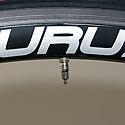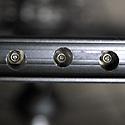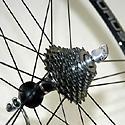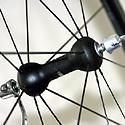
Recently on Cyclingnews.com |
Tech review - June 15, 2004
Campagnolo Eurus G3 wheelset
Close to perfection
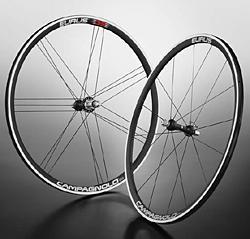
|
With a range of models from top-level racing through day-to-day riding and training, Campagnolo sent Cyclingnews' Chris Henry a pair of their mid-range Eurus G3 clincher wheels to use for several months. He wasn't disappointed.
Campagnolo has been known for decades for its solidly constructed, elegant components. Recent developments in the construction of wheelsets show that the Italian company has applied its usual flair to one of the most critical components on a bike.
The Eurus is what Campagnolo calls medium profile wheels, and the moniker fits in every respect. Neither the lightest nor most aero of their wheelsets, the Eurus are still more than suitable for fast training and racing, while at the same time tough enough for everyday use under a variety of conditions. Perfect for those of us who have notions of riding quickly but haven't quite found the time and opportunity to race as often as we'd like.
Designed to be light and responsive, the Eurus has enough of an aero edge offered by the slightly deeper rim sections and low spoke count. The rims are 20mm wide and 30mm deep, both front and back. The front wheels are laced radially with 16 bladed spokes while the rear wheels use Campy's "G3" system with seven sets of three spokes grouped together, two on the drive side and five on the non-drive side, for 21 spokes total. The configuration is both effective and attractive.
The company designed these wheels for increased lateral stiffness, better power transfer, and an effective balance of tension. The claimed weight for the pair of wheels (not including quick-release skewers) is 1,560 grams, which is a respectable weight for all-purpose performance wheels though perhaps a bit on the heavy side, relatively speaking.
The construction is all aluminum, with a machined braking surface. Spokes are all bladed and double-butted, adjusted through holes in the outer rim surface. Both wheels use oversize Record hubs, with the rear hubs 9 or 10 speed compatible (Campagnolo). The wheels come in Campagnolo's standard wheel color scheme: black spokes and black rims with silver lettering.
Testing conditions
|
|
|
|
|
|
|
The Eurus were used exclusively from November to early March on training rides typically lasting 2.5 to 3.5 hours. While no major mountains were tackled, the Eurus were tested on enough hills, typically short and occasionally steep. The wheels also got their fair share of rough pavement, city riding, and classic French pavé. Not to mention lots of rain, plenty of mud and grime, some snow, and generally dismal winter riding conditions in Paris.
Simply put, no flaws were noticeable with the Eurus as far as performance was concerned. The wheels roll smoothly, accelerate nicely, feel light and responsive. and for this 68kg rider, front wheel flex was not a concern . Exactly the ride this type of wheel should provide. The wheels felt stiff enough yet with a modest 30mm profile, they were not harsh at all on rough pavement on jarring bumps. As for the pavé, the Eurus fared quite well and held their own on the stones, both in terms of comfort and handling, but just as important, they stayed true. After nearly five months of steady use on some rather obnoxious roads, the Eurus finished as true as they began, despite the occasional pounding on the pavé and some urban curb hopping here and there. Impressive for wheels with 16 and 21 spokes. The standard aluminum braking surface also provided even, dependable stopping power with Campy's Record brakes.
More subjective, personal evaluation also gives the Eurus two thumbs up for their very sleek styling, clean look, and a rear freewheel which doesn't make too obscene a noise when coasting. The Eurus are the whole package: form and function. Additionally, while not a major concern, inner tubes with normal length valves worked fine with the Eurus. Only a bit of the valve protrudes from a 30mm deep rim, but with both floor and frame pumps, no trouble was encountered when inflating tires. It was close, but it worked.
One drawback
Except perhaps for the spiffiest of racing wheels, designed for specific occasions such as time trials or climbing races, servicing wheels should not require tire removal.
For a pair of wheels like the Eurus, meant for steady training but with performance still in mind, to have to remove the tire and rim tape to adjust the spoke tension is not the best design. Truing wasn't necessary during the course of this test, but someday it will happen, and breaking one of the thin, bladed spokes is not inconceivable either. It could be argued that the wheels are more aerodynamic thanks to the bladed spokes and concealed nipples, but then again they are still medium profile wheels that weigh in at 1,500 grams, so we're not talking about a design to shave precious seconds off of your ride of choice.
This critique aside, the Eurus are equal parts fast and dependable, perfect for high performance training and perfectly acceptable for racing. They look cool and do what Campagnolo says they will do.
Photography
Images by Campagnolo
- Campagnolo's Eurus G3 wheelset.
- The rear wheel with its unusual G3 spoking pattern.
Images by Chris Henry/Cyclingnews
- The 30mm medium-profile rim still allows a normal sized valve to be used.
- Spoke heads are located inside the hub, which makes adjustment a little more difficult.
- The rear wheel cluster.
- The oversize hubs are Record and have the classic lubrication hole.
- The front wheel has radial Ultralinear spoking.
Price: US$ 900.00
Weight: 1,560 grams (695g front, 865g rear) without skewers
Hubs: Campagnolo Record
Rims: 700c clincher, black
Spoke count: 16 front, 21 rear
Pro: Smooth, fast, responsive, stiff, very sturdy
Con: Could be a little lighter; spoke adjustment requires tire removal
More information: Campagnolo
website
Cyclingnews Rating: ![]()

